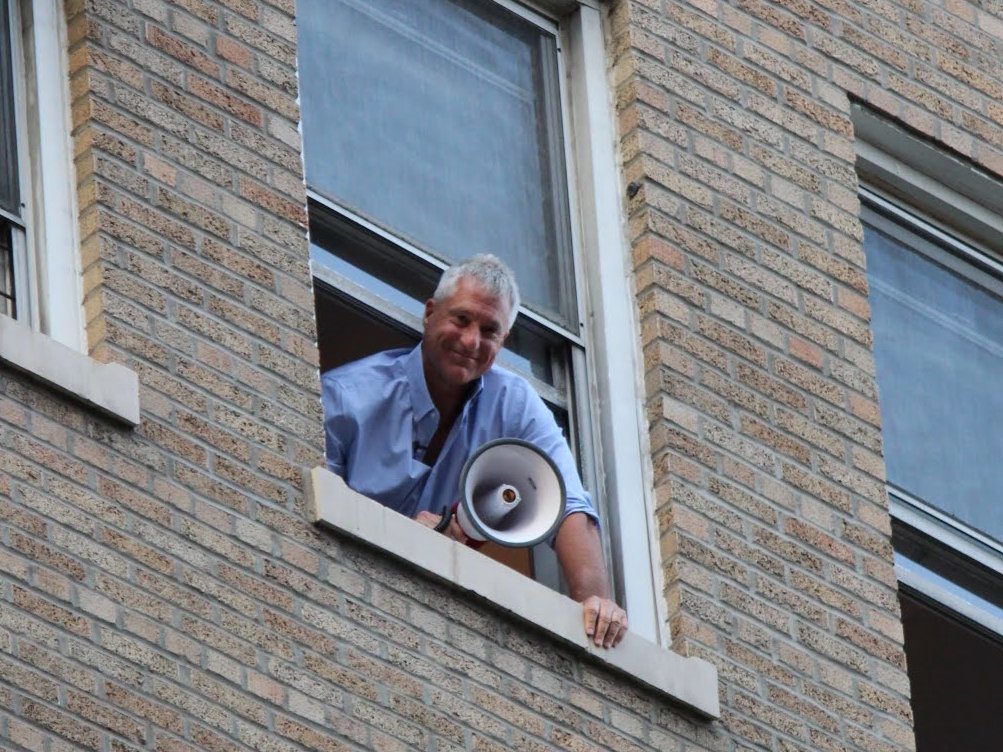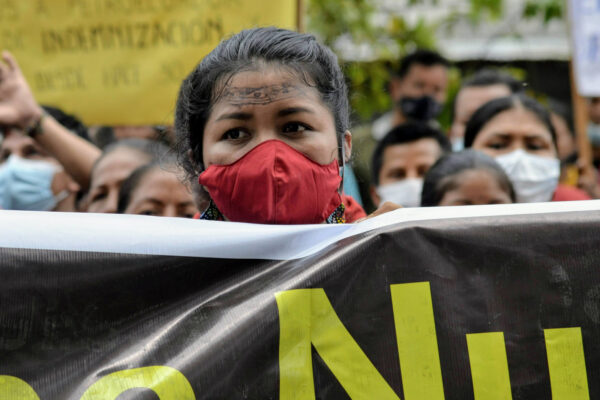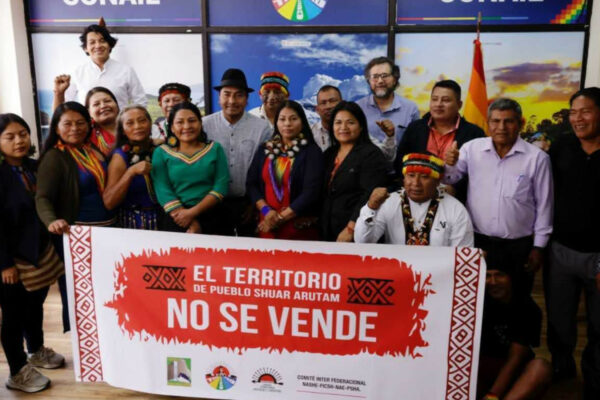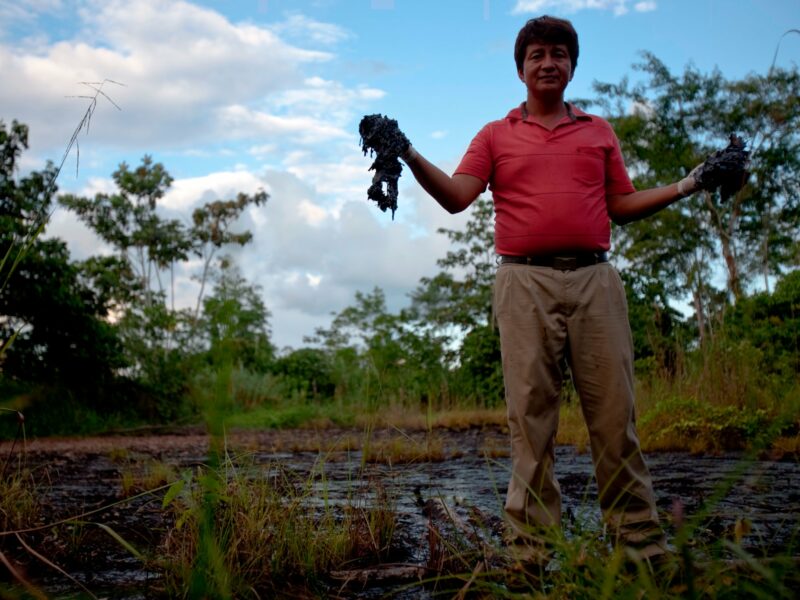After 993 days, Steven Donziger is finally free.
On Monday, the embattled lawyer, who has been targeted by Chevron for years in a Kafka-esque court struggle, finished a six-month sentence, which came on the heels of more than two years under house arrest in his Manhattan apartment. The ending of the saga is not without mixed emotions for Donziger.
“I am exhilarated to be able to live fully again, extremely excited to be able to make the normal choices people in a free society get to make,” he told me by phone on Monday. “I’m also stunned that I just spent two years and seven months of my life in detention in retaliation for my work in the climate justice field.”
Donziger’s story begins in 1993 in the Ecuadorian Amazon, when he began representing a group of 30,000 Indigenous people and farmers in a lawsuit against Texaco. The oil giant had set up shop drilling for crude oil in the region in the 1970s, and over the next two decades spilled 16 million gallons of crude (around 80 times what was spilled in the 2010 Deepwater Horizon disaster) as well as depositing billions of gallons of toxic waste in unlined pits, turning the area into an oil-pooled wasteland and poisoning soil and local water supplies. Texaco left the region—and its mess—behind in 1992 when its contract expired, and locals decided to file a lawsuit.
The case dragged on for 18 years, through Chevron’s 2000 purchase of Texaco, a transaction that made it the key defendant, until 2011, when an Ecuadorian court ordered Chevron to pay $18 billion in compensation (later reduced to $9.5 billion). Chevron, which still has not paid a cent of this fine, immediately began fighting the ruling. A key cornerstone of its efforts: to “demonize Donziger,” internal emails from Chevron sent in 2009 read. In 2012, Chevron launched a racketeering suit against Donziger and two other plaintiffs.
The abuses of power enacted in this case are so far-fetched as to be almost unbelievable. Shortly before trial, Chevron dropped any monetary claims it was making, which deprived Donziger and the other defendants of the right to a jury trial. Presiding over the case was New York U.S. District Court Judge Lewis Kaplan, who in the courtroom called Chevron “a company of considerable importance to our economy” and banned Donziger and the other defendants from bringing up Chevron’s pollution in the Amazon during the trial. The oil giant’s main evidence relied on the testimony of a disgraced Ecuadorian judge, Alberto Guerra, who had accepted hundreds of thousands of dollars from Chevron and met with Chevron’s lawyers a whopping 53 times before the trial. (Guerra later admitted he lied in his testimony.) Kaplan found Donziger and other defendants guilty in 2014.“What happened to me goes way beyond just me. It was part of a design by the fossil fuel industry…to create a playbook to silence those who advocate effectively and successfully against major polluters who are destroying the planet.”
The saga didn’t end there—and somehow got even more twisted. In 2019, Kaplan asked federal prosecutors to bring contempt of court charges against Donziger for refusing to hand over his electronic devices and passports during the trial. (Donziger said giving his electronics to the court would betray private client information.) After public prosecutors declined to press charges, Kaplan pulled the unprecedented move of assigning a team of private prosecutors to prosecute Donziger—the first time this had happened in U.S. judicial history. The team Kaplan chose was led by an attorney who at the time worked for a law firm with a history of representing Chevron. Kaplan again went against usual procedure for these cases and also handpicked the judge, Loretta Preska, who has a history of positive rulings in favor of energy companies and serves as an advisor to the Federalist Society, a pro-business group that has benefited from donations from Chevron. Preska put Donziger under house arrest before the trial, claiming he represented a flight risk.
While the case is certainly a wild example of justice run amok, it has chilling implications for what could be possible for a private company looking to use the courts to silence critics. “What happened to me goes way beyond just me,” Donziger said. “It was part of a design by the fossil fuel industry and some of its high-priced lawyers to create a playbook to silence those who advocate effectively and successfully against major polluters who are destroying the planet.”
Last July, Preska found Donziger guilty of misdemeanor charges of criminal contempt. In November, the United Nations High Commissioner on Human Rights, the world’s top human rights body, ruled that Donziger’s house arrest was illegal under international law and called on the U.S. to release him. Six international jurists that made up the UN body said in a brief that they were “appalled by uncontested allegations in this case,” adding that Donziger’s criminal charges and arrest “[appear] to be retaliation for his work as a legal representative of indigenous communities.” Despite the UN ruling, Judge Preska sentenced Donziger to six months in prison, the maximum sentence, a day after the UN issued its brief. (Donziger was returned to house arrest in December 2021 under a pandemic early-release program.)
Despite the injustices foisted on him for the past few years, Donziger sees a particular victory against Chevron in the newfound attention to his case and Chevron’s pollution in the Amazon. “They tried to turn me into a symbol as part of this intimidation campaign,” he said. “I would argue that what ended up happening was the opposite of what they intended. They thought they could crush me, but they created a situation where I now have a platform and a voice. I think they have a real problem now.”
The struggle isn’t over now that his sentence is done. Donzinger and his supporters — which include leading organizations like Amnesty International, as well as several lawmakers in Washington — are working to secure a pardon for Donziger from President Biden. A pardon, he explained, wouldn’t set a legal precedent to prevent a case like his from happening again, but it could discourage other judges from trying out the same tactics on the next person who dares stand up to Big Oil.
“What Chevron and the industry want to do is make this the new normal,” he said. “This will happen again unless people wake up and stop it from happening again.”














